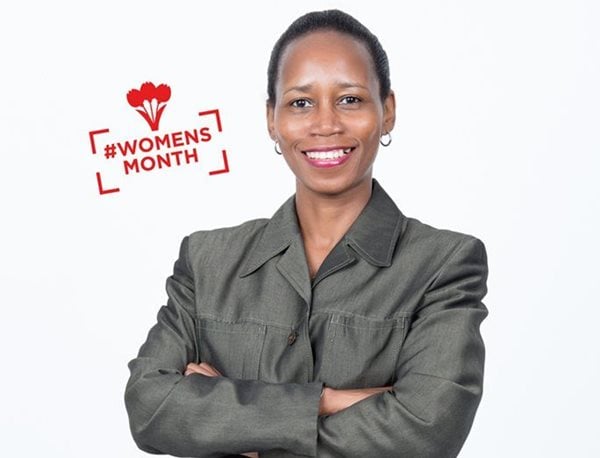
This #WomensMonth she shares highlights of her career, how women can shine in the tech industry and what Vodacom is doing to empower women entrepreneurs.
I am a national security lawyer and diplomat by profession – a public servant at heart who believes in using technology as a tool for development, and that big businesses can make profit whilst at the same time doing good.
Vodacom Group simplified its structure from 1 July 2020. Vodacom South Africa, is now a stand-alone operating company with its own MD and executive committee.
I am now the chief officer of external affairs for Vodacom South Africa, and my role is expanded to include telecommunications regulatory affairs which involves managing regulatory issues, approvals and compliance.External Affairs serves as the interface between the company and the external environment. Over and above regulatory affairs, I monitor the evolution of public policies and advise the company for us to respond and implement accordingly, I drive business sustainability ensuring we work towards the attainment of the sustainable development goals, I run the Vodacom Foundation which is the corporate social investment arm of the company, and I also drive internal and external communications.
I don’t have specific role models. I take different character traits from different people that inspire me such as honesty, integrity, staying truthful to myself and maintaining my privacy. My parents had immense influence on the person that I am.
I have had an auspicious career indeed! I was ministerial legal and policy advisor at the age of 28, a career that catapulted me to a security law writer and policy advisor engaging with members of parliament, ministers and presidents. Following extensive law writing, I had management exposure in cybersecurity which saw me selected for studies at the Harvard Kennedy School of Government. The greatest honor in my career was being a diplomat, representing my country as ambassador in Europe, after which Vodacom found me.
There is change albeit slow.
We are seeing more women now taking the science, technology, engineering, and mathematics subjects. As part of our skills development program, we spent R149 million on women in 2019/20.In the same year, of the 71 graduates selected, 45% were women. We also run a coding program for girls. Nevertheless, there is still under-representation of women in the ICT sector. Vodacom has 43,5% women representation, 34,4% of women are in senior management, 28,5% are in the Vodacom South Africa Board and 37,5% are in Vodacom South Africa EXCO.
Toxic masculinity is one of the biggest challenges in the work place for women, and sometimes also for empathetic men, both in the public and private sector. The corporate work environment is highly competitive, aggressive, and highly target driven thereby demanding long working hours. These factors deter some women from aspiring to executive positions, and those in these positions can feel isolated and very lonely up there.
These negative factors are nurtured by a patriarchal society which encourages men to be aggressive and “a winner takes it all.”In order to fit in, some women get assimilated into this toxic culture and find themselves wittingly or unwittingly alienating other women and feeling even lonelier.
I am personally finding that working from home during the Covid-19 pandemic has been rewarding psychologically. Although I work longer hours than during the pre-Covid-19 period, I cherish my private space and having enough time to myself. I make time to exercise indoors and have more time to reflect on life, and I keep in touch with family and friends online.
As policymakers, government needs to create a conducive environment for entrepreneurship to thrive, by promoting skills development, financial inclusion and mentorship programs.
Without removing access barriers to skills development, finances and digital transformation; and without role models, we cannot have sustainable entrepreneurship. However, government alone cannot address societal challenges.Partnerships are required with big business for mentorship programs, and with civil society organisations to change societal stereotypes that relegate women to support and administrative positions.
We have the innovator trust which is an SMME development agency that Vodacom created at arms length in 2014. It provides business skills development to SMMEs in the ICT sector.
Although the businesses are gender diverse, Forty (40) 100% female-owned businesses are beneficiaries of the innovator trust. We also have a woman farmers program in partnership with UN Women and South African Women in farming where we train women to use information communication technology to enhance their business opportunities.So far we have trained 1,200 women across the country and the current phase of training is to introduce an app which will connect these women farmers across the agricultural value chain. So far, 250 women farmers have been registered on the App.
We need a multi-pronged approach which focuses on prevention, response and victim and perpetrator support.
Prevention is key, starting with tackling patriarchy and the social construction of gender identity where the boy-child is socialized to be aggressive, and the girl-child to be submissive and be an object of a man’s desire.This should start with parents, and extend to caregivers and teachers where the boy and girl should be socialized to treat each other as equals, and are treated as equals.
Young women must defy societal stereotypes that assign gender roles on the basis of biological sex.
They must say no, enough is enough!They must also remember that, education, hard work and luck are key to success - they must demand their rightful place in the classroom and in the workplace as equals.
Let’s celebrate ourselves as women, we owe it to ourselves, whilst at the same time standing together with good men against gender discrimination, toxic masculinity and patriarchy.